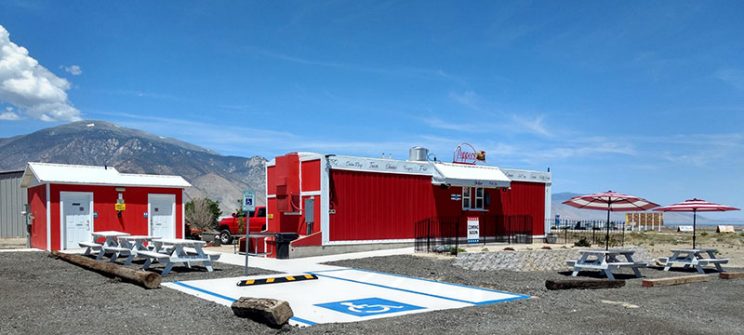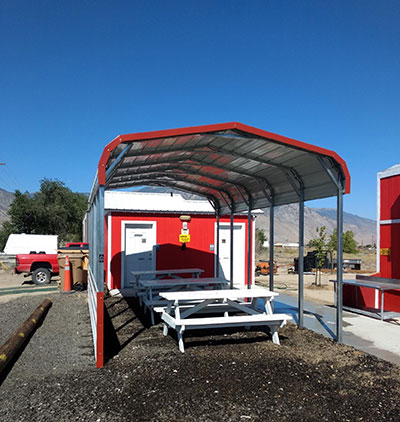
By Elizabeth Zach, RCAC staff writer
Hawthorne, Nev. – Western Nevada, with a desert patch landscape that gives way to bare mountain slopes for miles and miles, is known for something unique and even record-breaking.
The Army depot near Hawthorne stores reserve ammunition to use in the first 30 days after a major conflict. Established as the Hawthorne Naval Ammunition Depot in 1930 and later the Hawthorne Army Ammunition Plant in 1977, it is the world’s largest depot. It covers 226 square miles and houses 2,427 bunkers. It is also Hawthorne’s largest employer. If you were to fly low over the area, you would see neatly arrayed bunkers that enclose Hawthorne.
For many years, it was where Chris Hegg worked as a computer-systems engineer and electronics technician for Educational Data Systems, Inc. (EDSI), a contractor at the Depot. His wife Diane was his colleague and worked as an administrative assistant until she became pregnant with their second child. While working at the Depot kept him intrigued, Hegg dedicated his off-hours to something else entirely: cooking; specifically grilling and mastering the art of making BBQ sauce.
“Both of our families had roadside bars so we were sort of born with that mindset,” Chris says. “I’ve always loved cooking.”
“Funding was, without question, our biggest challenge,” ~Chris Hegg co-owner.
They knew from having worked together that they would make a good team, and they wanted to work together again. Chris thought he could put his cooking passion to good use in a new business venture, so they bought a food trailer and commercial lot, and opened a new eatery that they christened “Pepper’s Place.”
But the Heggs had bigger plans, and in spring 2016, they applied for and received a $65,000 loan from Rural Community Assistance Corporation (RCAC) so they could expand to a permanent location.
RCAC’s Loan Fund creates jobs and encourages economic development in rural communities. The great majority of American businesses are small, in rural areas, and are critical to providing jobs and vital services. The Heggs’ business fits that profile, according to Darryl English, the RCAC loan officer who worked with them to expand their business.
“Overall, the feasibility of this project is good, primarily because the applicant already was operating a food trailer nearby, so they have a built-in customer base,” English says. “Their challenge will be to move that base to the new location and attract new customers to be able to meet their projections.”
He added that the Heggs live frugally on a tract of mountainous land and had already been living on the income generated from Pepper’s Place. With the new location, the Heggs will be able to expand their business hours.
“Based on the success of the food trailer,” English observed, “it seems that the permanent location being open from 10 a.m. to 8 p.m. daily instead of four hours per day should be a success and increase their income.”
“Funding was, without question, our biggest challenge,” Chris says. “We first went through the Small Business Administration, taking classes, and we learned a lot. But I think it would have taken us years to get through all of that.”
Chris was both flummoxed and frustrated to learn just how much capital small business owners need at the outset to actually get their business plans off the drawing table.
“It sounds a little strange but it’s true, that you need money to get a loan,” Diane says. “You need money for things like a building permit and, in our case, flood insurance. It was a loop of problems that we spent two years trying to get through.
“Just securing a contractor,” Diane continues, “was a major hurdle. There are only two in Mineral County.”

Both Diane and Chris can oversee all parts of the business, but Diane mostly does the bookkeeping and orders supplies while Chris cooks and manages catering events.
On a recent morning in Hawthorne, Chris talked about buying freezers and balancing food orders. He described their original food trailer, an 18 x 7-foot container, but the new unit is 40 x 12-foot and beckons as an appealing red and white style diner with shaded picnic tables in front. The menu features burgers, cornbread, baked beans, coleslaw, patty melts and hot dogs. The ability to seat more customers has brought in truckers, and the extended business hours have also drawn visitors. Wide streets also make it easier for wide and large vehicles get to the restaurant.
“We already have a very loyal clientele,” he says. “We keep some regular mugs for truckers we see again and again, driving between Idaho and into Reno and Las Vegas and who keep coming back. We see plenty of RVs, too, since this is a big area for snowbirds.” (Retirees looking for a warmer climate in the winter months.) The Tesla Gigafactory-1, located near Reno, has also been a boon to lunch and dinner business, he adds.
Reflecting on their business, the Heggs say that if not for the RCAC loan and Darryl English’s encouragement and patience, they could not be doing what they do. English broke down figures and developed financial projections, and took a critical look at the different phases of starting a business. The Heggs say that they would have achieved their goals eventually but that the RCAC loan accelerated the process in a much-needed way.
“We tended to overestimate our numbers,” Chris says. “Darryl worked very hard, helping us with quarterly reports and helping us see the bigger picture and plan well. He was a real professional, and we really are grateful for the loan.”
Feature photo: Pepper’s Place facade with plenty of outdoor seating serves burgers, cornbread, baked beans, coleslaw, patty melts and hot dogs.
